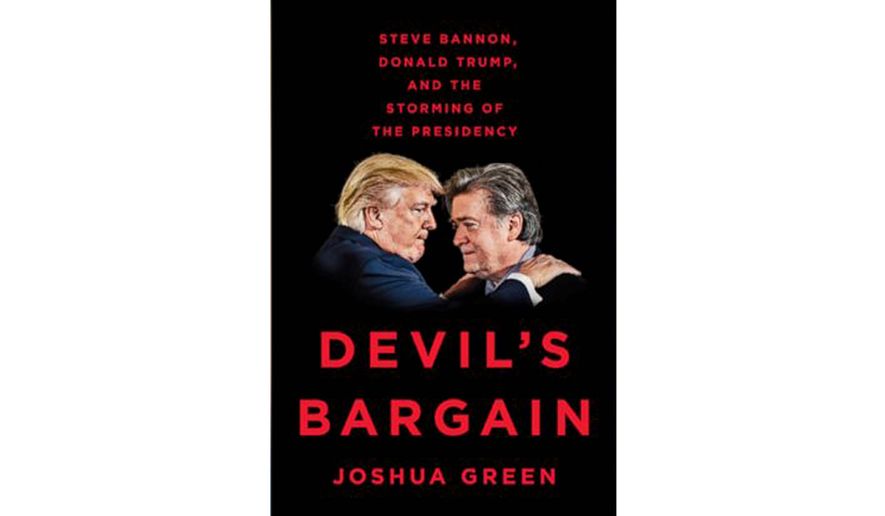OPINION:
The one constant of Washington politics is transience. Consider the case of presidential adviser and chief political strategist Steve Bannon, until recently the bete noir of the mainstream media. After being cast as Donald Trump’s evil brain in the opening months of the new administration, he now looks like a pussycat — especially when compared to the hyperaggressive, foul-mouthed Anthony Scaramucci, the president’s mercifully short-lived communications director.
One of “The Mooch”’s first moves was to make an obscene and anatomically-incorrect remark about Mr. Bannon in what he thought would be an anonymous leak to a New Yorker political reporter (in which, ironically, he denounced White House leakers). Thanks to his poor judgment and mega-trashy vocabulary, Mr. Scaramucci worked a political miracle: on the theory that the enemy of my enemy is my friend, he rendered Steve Bannon almost respectable in the eyes of the White House press corps. Politics does, indeed, make for strange bedfellows.
“Devil’s Bargain,” reporter Joshua Green’s intelligent, insightful and fast-moving account of Mr. Bannon’s strategic role in the biggest presidential election upset of all time, was published before Mr. Scaramucci’s barracuda attack but is in no way diminished by it. First and foremost it is the story of how one unconventional but patriotic political thinker connected with a not particularly thoughtful but patriotic tycoon to mobilize outside-the-beltway America’s growing concern — and mounting anger — at what was seen as Washington’s role in eroding our country’s moral and material foundations.
Despite the “Devil’s Bargain” title of Mr. Green’s book, there was nothing sinister or even particularly unusual about this. It was simply a matter of a candidate and a strategist with overlapping but not identical views — and complementary skill sets — working together to forge a major political victory.
Karl Rove played a similar role in George W. Bush’s upset victory over Al Gore in 2000 and many other past presidents have had an in-house consigliere with a private line to the chief executive. Woodrow Wilson’s Colonel House and FDR’s Harry Hopkins spring immediately to mind.
Perhaps one reason so many political observers have puzzled over the Trump-Bannon symbiosis is the staggering surface differences between the two men. Mr. Trump, despite his excess poundage and comic comb-over, prides himself on being a snappy dresser and doesn’t suffer slovens gladly.
Mr. Bannon, who often looks and dresses as if his last known address was a park bench, would seem to embody everything that turns The Donald off. But both men appear to have seen through these superficial differences and sensed what each had to offer the other. “It was clear the connection was genuine,” Mr. Green writes, since, in the words of political consultant Roger Stone, “Steve is a slob, and Trump hates slobs.”
Of course, much as Al Gore played just as important a role in W’s 2000 victory as Karl Rove, Hillary Clinton may have been the best thing the Trump-Bannon team had going for them in 2016.
Once ensconced in the White House as a senior aide to a sitting president, Mr. Green writes, “Bannon, whose wild gambits in the campaign had invariably paid off, seemed to run out of magic tricks once Hillary Clinton was no longer a target. The government wasn’t as malleable to Mr. Trump and Mr. Bannon’s aggressions as the Republican Party and the cable news channels had been, and they found themselves consistently thwarted and undermined — by the courts, by right-wing hard-liners in Congress, by their own inexperience and Mr. Trump’s errant tweets, and by the bureaucracy they were now overseeing. The crises these failures precipitated in the White House cost Mr. Bannon much of his influence and soon threatened Trump’s presidency.”
That particular conclusion, whether ultimately true or not, is certainly premature. But, as an occasional historian, it reminded me of a forgotten episode in the history of a very different country than America. In 1929 a populist bandit marched his ragtag followers on Kabul, scattering the regular army of the long-established, complacent royal dynasty in their wake.
The world was astonished when the bandit had himself crowned as Habibullah, King of Afghanistan, seemingly ushering in an age of revolutionary change. Before the year was out, so was King Habibullah. He had been capable of seizing the reins of power but incapable of holding onto them. The old dynasty returned and it was business as usual in Afghanistan for the next half century.
• Aram Bakshian Jr., an aide to Presidents Nixon, Ford and Reagan, writes widely on politics, history, gastronomy and the arts.
• • •
DEVIL’S BARGAIN: STEVE BANNON, DONALD TRUMP AND THE STORMING OF THE PRESIDENCY
By Joshua Green
Penguin Press, $27, 272 pages




Please read our comment policy before commenting.